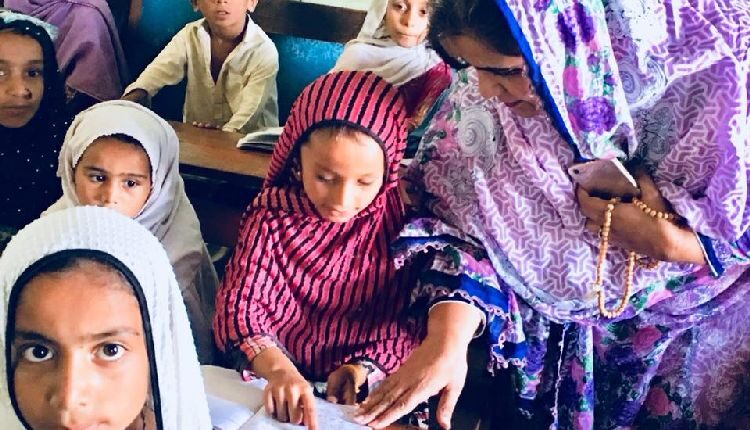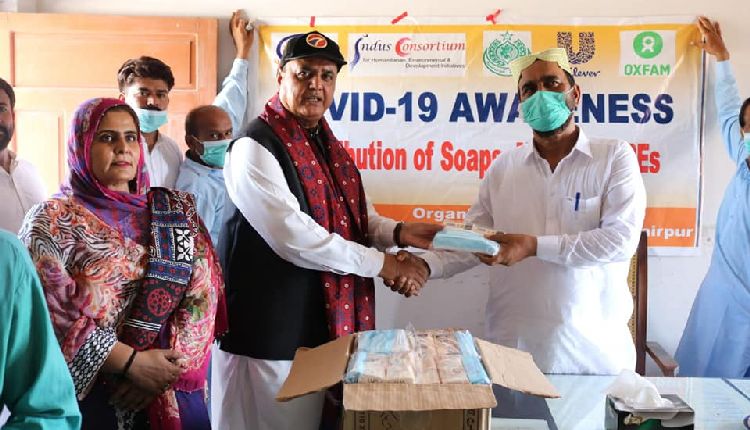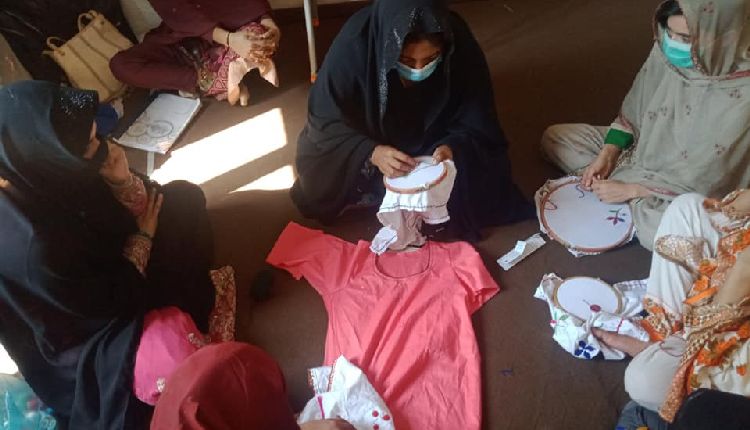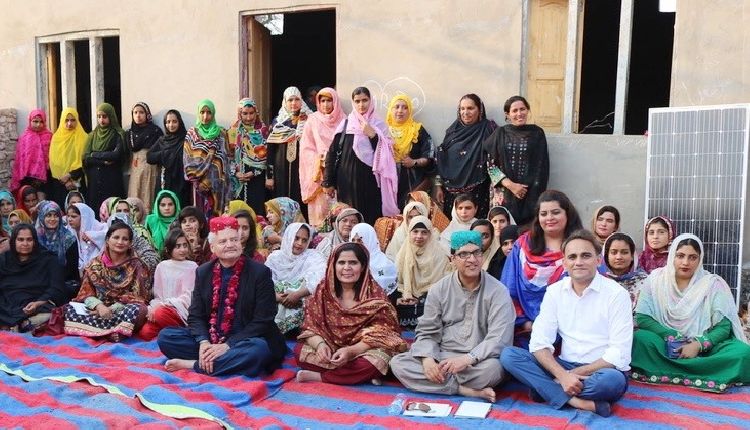Sughra, from child bride to women's rights activist

A 12 years she was forced to marry. A 20 she was abandoned by her husband. Illiterate, he decided to study and become a teacher. Today she chairs an NGO that supports the development and empowerment of women in rural communities. At the Rights Observatory he tells his story.
Child bride at the age of 12 years and illiterate, because this is what tradition wanted, in his village in Sindh province, in Pakistan. Then, at the age of 20 years, abandoned by that husband she had been forced to marry.
She returned to her village with her two children, Ghulam Sughra Solangi challenged conservative social norms, the macho and patriarchal mentality, the opposition of his family and the severe judgment of the people: he decided to study, she became the first girl in her community to earn a high school diploma, then the first teacher in a girls' school in her village.
In 2014 the meeting with Malala Yousafzai, Nobel Peace Prize
Today, a 50 years, Sughra is a famous activist for the rights of women and girls. In 1994 he founded the Marvi rural development organization (Mrdo), an NGO working in Sindh, based in Sukkur, to promote human rights, Health, education, strengthen the role of women.
In 2011 received the International women of courage award in the United States (brave women in the world), delivered to her by Hillary Clinton and Michelle Obama. In 2014 met Malala Yousafzai in England, the young compatriot Nobel Peace Prize winner of 2014: he had a fruitful dialogue with her on education and the strengthening of women's rights in Pakistan.

Child brides: the story of Sughra
A few days before the World Day against Violence against Women (25 November), Sughra tells his story to the Osservatorio Risorse, its resilience capacity, his battles against prejudices, discrimination, hypocrisy.
«I was born in 1970 in Sindh, in a rural village of 200-300 case. My father was a teacher in a public school. My mother was a housewife: she has always supported me at every stage of my life. I have always shared everything with her. At home we were a daughter and three sons. As a child I wanted so much to go to school, but my dream was shattered by the local tradition for which women do not need to leave the house and seek education. I had to get married at the age of 12 years. When I had 20, my husband abandoned me accusing me of being illiterate and unattractive. After my divorce, all I had left were my children. When I got home to my parents, I felt rejected, humiliated, enough to almost commit suicide. But I resisted and moved on. I began to express my willingness to go to school, but my brothers prevented me. I was born into a very conservative family and environment, it is true, but I grew up with a strong sense of equality and equal opportunities for women and with the will to do everything possible to contribute to change ".
The witness: between prejudices and threats
His life took on a new path when Sughra began studying as a self-taught. “The turning point came when my brothers allowed an older cousin of mine to follow me through my studies. After four years I passed the first school exam. And I was not discouraged, not even when people humiliated and ridiculed me. To support my children and me, in the evening until late I did embroidery work. Economic independence allowed me to gain autonomy from my parents and be able to continue studying ".
His battle was not without suffering. On its way, Sughra has been threatened many times, he received intimidation from the feudal lords, the large landowners who aim to keep the rural population ignorant and subjugated. But nothing stopped her resolve. To give her great support, at a certain point, it was another man who entered her life, her second husband, which however in the 2014 he was torn from her by cancer.

Against taboos and oppression: a phenomenon difficult to eradicate
Sughra has a daughter and son. She considers herself a proud mother. His daughter, Saira, she inherited her aspirations as a free woman.
Sughra tells: "For ten years Saira has been fighting to free young Pakistani girls from the chains of injustice, discrimination and oppression. She is convinced that social taboos do not allow women to raise their voices and that fear of retaliation pushes them to continue being victims of abuse.. I ask my son and daughter to work in the service of humanity and for social justice. Saira is managing the problems of the poorest and the oppressed through the Marvi rural development organization ".
Child brides, poverty, illiteracy: a vicious circle to break
From its inception to today, the NGO has achieved 60 projects on women's emancipation, inter-religious peace and harmony, salute, instruction, emergency response, legal protection, inclusion of people with disabilities, development related to gender issues, reaching more than 580.000 direct beneficiaries in eleven districts of Sindh.
Says the activist: «Women from rural communities are in the condition of victims, deprived of their rights, excluded from the benefits of community development. Education is a force that can help promote their rights, but in rural regions, girls do not have access to school. The feudal system rooted in Sindh is responsible for the hardships and atrocities committed against the female population. In rural Pakistan, women are discriminated against by the community and kept in submission. My goal is to give them the chance to go to school, eliminating the economic barriers that limit their education ".
As an activist, Sughra soon realized that girls don't go to school not just because of social norms, but also because of the poverty of families. Promoting women's economic emancipation has therefore become one of its primary objectives, because it means breaking the vicious circle that binds poverty, illiteracy, ignorance of one's rights, submission.

Early marriages prohibited, but widespread
Sughra recalls the numerous violations still widespread in Pakistan: Domestic violence, torture in the family environment, forced and early marriages, sexual violence, abuse and mistreatment in educational institutions.
When it comes to early marriages, Sindh was the first province to pass a law in 2013 which bans this practice. Nevertheless, these marriages continue to be an entrenched reality throughout Pakistan.
«In Sindh women are economically and politically marginalized, defenseless in the face of violence. In our province, a very high number of girls drop out of school because they are forced to marry, or even due to other practical problems, like the distance of the schools from the villages, the lack of transport, poor security conditions, the absence of infrastructure and toilets in school buildings ".
The barbaric practice of honor killing
And then, the plague of karo kari, the crime of honor: according to United Nations data, at least one thousand women in Pakistan are killed every year because they are accused of dishonoring their families. But there are thousands of cases of murders that remain in the shadows and in silence.
“Karo kari originated in Sindh, which is unfortunately the province where it is practiced the most. It is mainly women accused of premarital or extra-marital affairs. Most of the cases remain unsolved ". Changing cultural and social systems rooted in tribal communities is a difficult undertaking, but not impossible. However, it is necessary to start from the judicial system.
“There are laws to prevent these barbaric practices but, as a next step, the police must be obliged to investigate cases of honor killing and punish tribal justice, which cannot be tolerated. Furthermore, the state must take steps to promote awareness of what the laws prescribe ".
The battle for the rights of girls
There is still a lot to do in Pakistan. “Today something is moving, thanks to the awareness campaigns launched by various non-profit organizations, from civil society, by the media. NGOs play an important role, but in Pakistan their effective capacity to act is also limited due to the scarcity of financial resources at their disposal. This is why I appeal to the state to strengthen civil society organizations ".
Sughra is confident: «The change is already underway. I see it in my work as an activist in rural communities: many parents today are sensitized, they send their daughters to school, they think about their education ". Her dream is that more and more women in Pakistan raise their voices, as she did many years ago, challenging stigma, threats, intimidation. Fearless, finally free to be what they want in their life.